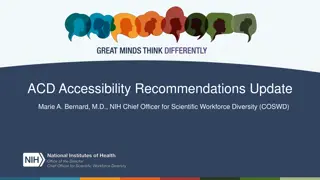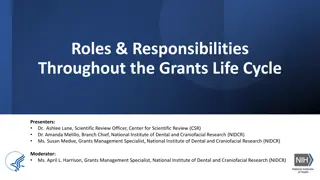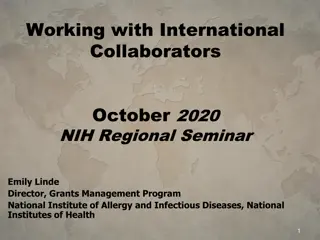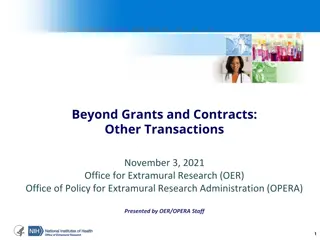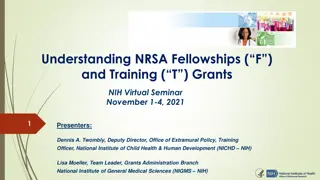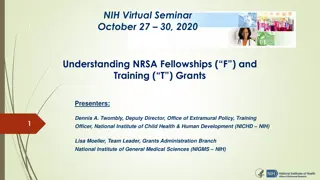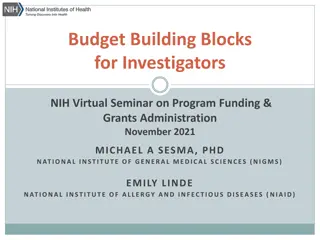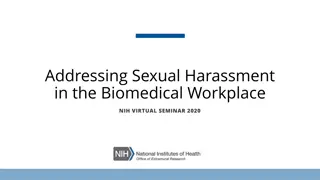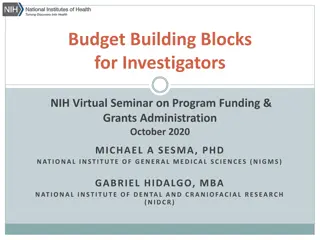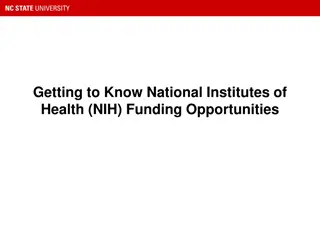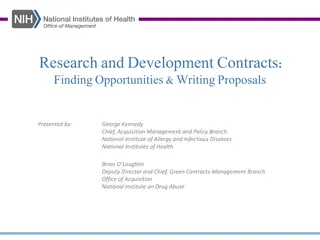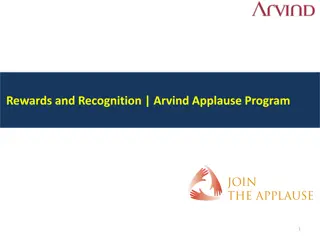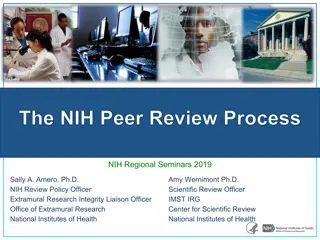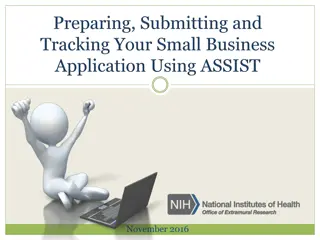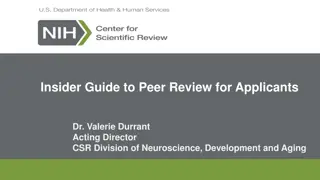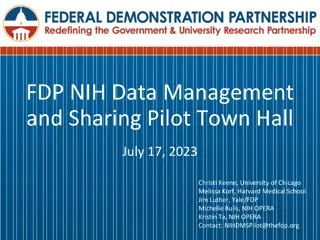Guide to NIH K-Awards: Application, Types, and Opportunities
A comprehensive overview of NIH K-Awards, including what they entail, the various types available (such as K01, K07, K22), and the opportunities they offer for researchers at different career stages. Learn about mentorship, research strategies, and institutional commitments crucial for a successful application process.
Download Presentation

Please find below an Image/Link to download the presentation.
The content on the website is provided AS IS for your information and personal use only. It may not be sold, licensed, or shared on other websites without obtaining consent from the author. Download presentation by click this link. If you encounter any issues during the download, it is possible that the publisher has removed the file from their server.
E N D
Presentation Transcript
K-AWARDS: GUIDELINES FOR THE APPLICATION AND SUBMISSION PROCESS Monique J. Brown, PhD, MPH Department of Epidemiology and Biostatistics CCADMR Seminar April 15, 2022
OUTLINE What is a K-Award? Types of K-Awards Mentorship Team Candidate Section Environmental and Institutional Commitment to the Candidate Research Strategy Reference Letters Summary
WHAT IS A K-AWARD? Research career development award granted by the NIH that provides individual and institutional research training opportunities
TYPES OF K-AWARDS K01 - For support of a postdoctoral or early career research scientist committed to research, in need of both advanced research training and additional experience. K02 - For support of an early to mid-career scientist with research funding, in need of additional protected time committed to research. K05 - For the support of a senior research scientist with research funding, to pursue independent research, and to serve as a mentor to more junior research scientists
TYPES OF K-AWARD (CONT.) K07 - To support either a mentored or independent investigator to develop or enhance curricula, foster academic career development of promising young teacher-investigators, and to strengthen existing teaching programs K12 - To provide support for newly trained clinicians appointed by an institution for development of independent research skills and experience in a fundamental science within the framework of an interdisciplinary research and development program.
TYPES OF K-AWARD (CONT.) K22 - To provide support to outstanding newly trained basic or clinical investigators to develop their independent research skills through a two- phase program; an initial mentored research experience, followed by a period of independent research. K99/R00 - To support both an initial mentored research experience (K99) followed by independent research (R00) for highly qualified, postdoctoral researchers, to secure an independent research position. Award recipients are expected to compete successfully for independent R01 support during the R00 phase.
TYPES OF K-AWARD (CONT.) K23 - To provide support for the career development of clinically trained professionals who have made a commitment to patient-oriented research, and who have the potential to develop into productive, clinical investigators K25 - To support the career development of investigators with quantitative scientific and engineering backgrounds outside of biology or medicine who have made a commitment to focus their research endeavors on basic or clinical biomedical research.
CHOOSING A MENTORSHIP TEAM Mentors should be experts in areas where you seek mentorship Avoid overlap of expertise Two mentors should not be mentoring you in one topic area
CHOOSING A MENTORSHIP TEAM (CONT.) Great if mentors are well-known in the field Double-edged sword? May not have time to be an involved and engaged mentor Mixture of senior and mid-career experts Should have a track-record of successfully mentoring candidates at your level Biosketches should show these points
PLAN AND STATEMENT OF PRIMARY MENTOR Together with the candidate, is responsible for the proposed program: Planning Directing Monitoring Executing The mentor should have sufficient independent research support to cover the costs of the proposed research project in excess of the allowable costs of this award.
PLAN AND STATEMENT OF PRIMARY MENTOR Information on his/her/their research qualifications and previous experience as a research supervisor A plan that describes the nature of the supervision and mentoring that will occur during the proposed award period A plan for career progression for the candidate to move from the mentored stage of his/her career to independent research investigator status during the project period of the award A plan for monitoring the candidate s research, publications, and progression towards independence
PLAN AND STATEMENT OF PRIMARY MENTOR The primary mentor must agree to provide annual evaluations of the candidate s progress as required in the annual progress report.
CO-MENTORS The candidate may also nominate co-mentors as appropriate to the goals of the program. Similar information must be provided by any co-mentor. If more than one co-mentor is proposed, the respective areas of expertise and responsibility of each should be described. Co-mentors should clearly describe how they will coordinate the mentoring of the candidate. If any co-mentor is not located at the sponsoring institution, a statement should be provided describing the mechanism(s) and frequency of communication with the candidate.
CO-MENTORS If the applicant is proposing to gain experience in a clinical trial as part of his or her research career development, the mentor or a member of the mentoring team must include a statement to document leadership of the clinical trial, and appropriate expertise to guide the applicant in any proposed clinical trials research experience.
COLLABORATORS, CONTRIBUTORS AND CONSULTANTS Signed statements must be provided by all collaborators and/or consultants confirming their participation in the project and describing their specific roles. Information should be provided clearly documenting the appropriate expertise in the proposed areas of consulting/collaboration.
CANDIDATE BACKGROUND Describe the candidate's commitment to a health-related research career. Describe all the candidate's professional responsibilities in the grantee institution and elsewhere and describe their relationship to the proposed activities on the career award. Describe prior training and how it relates to the objectives and long-term career plans of the candidate.
CANDIDATE BACKGROUND (CONT.) Describe the candidate's research efforts to this point in his/her research career, including any publications, prior research interests and experience. Provide evidence of the candidate's potential to develop into an independent investigator. Usually this is evident from publications, prior research interests and experience, and reference letters.
CAREER GOALS AND OBJECTIVES Describe a systematic plan that: Shows a logical progression from prior research and training experiences to the research and career development experiences that will occur during the career award period and then to independent investigator status Justifies the need for further career development to become an independent investigator.
CAREER GOALS AND OBJECTIVES (CONT.) The candidate must demonstrate they have received training/will participate in courses: Data management Epidemiology Study design (including statistics) Hypothesis development Legal and ethical issues associated with research on human subjects and clinical trials
CANDIDATES PLAN FOR CAREER DEVELOPMENT The candidate and the mentor are jointly responsible for the preparation of the career development plan. A career development timeline is often helpful. The mentor and any co-mentor may form a mentoring team to assist with the development of a program of study or to monitor the candidate's progress through the career development program.
CANDIDATES PLAN FOR CAREER DEVELOPMENT The didactic (if any) and the research aspects of the plan must be designed to develop the necessary knowledge and research skills in scientific areas relevant to the candidate's career goals. Describe the professional responsibilities/activities including other research projects beyond the minimum time required. Explain how these responsibilities/activities will help ensure career progression to achieve independence as an investigator.
ENVIRONMENTAL AND INSTITUTIONAL COMMITMENT TO THE CANDIDATE
DESCRIPTION OF INSTITUTIONAL ENVIRONMENT The sponsoring institution must document a strong, well- established research and career development program related to the candidate's area of interest, including a high- quality research environment with key faculty members and other investigators capable of productive collaboration with the candidate Describe: How the institutional research environment is particularly suited for the development of the candidate's research career and the pursuit of the proposed research plan The resources and facilities that will be available to the candidate
INSTITUTIONAL COMMITMENT TO THE CANDIDATE S RESEARCH CAREER DEVELOPMENT The sponsoring institution must provide a statement of commitment to the candidate's development into a productive, independent investigator and to meeting the requirements of this award. It should be clear that the institutional commitment to the candidate is not contingent upon receipt of the award. Provide assurance that the candidate will be able to do minimum time required to the development of his/her research program. The remaining effort should be devoted to activities related to the development of the candidate s career as an independent scientist.
INSTITUTIONAL COMMITMENT TO THE CANDIDATE S RESEARCH CAREER DEVELOPMENT Provide the candidate with appropriate office and laboratory space, equipment, and other resources and facilities (including access to clinical and/or other research populations) to carry out the proposed research plan. Provide assurance that appropriate time and support will be available or any proposed mentor(s) and/or other staff consistent with the career development plan.
RESEARCH PLAN A sound research project that is consistent with the candidate s level of research development and objectives of his/her career development plan must be provided. The research description should demonstrate the quality of the candidate s research thus far and also the novelty, significance, creativity and approach, as well as the ability of the candidate to carry out the research. Description of the relationship between the mentor s research and the candidate s proposed research plan
RESEARCH PLAN WITH CLINICAL TRIALS If the applicant is proposing to gain experience in a clinical trial, ancillary clinical trial or a clinical trial feasibility study as part of his or her research career development, describe the relationship of the proposed research project to the clinical trial.
RESPONSIBLE CONDUCT OF RESEARCH All applications must include a plan to fulfill NIH requirements for instruction in the Responsible Conduct of Research (RCR). Classes One-on-one meetings Seminars Workshops
LETTERS OF RECOMMENDATION At least three, but no more than five, reference letters are required. The letters should be from individuals not directly involved in the application, but who are familiar with the applicant s qualifications, training, and interests. The mentor or co-mentors of the application cannot be counted toward the three required references.
SUMMARY K-awards are great opportunities to: Obtain additional training Protected time to conduct your research However, a few may see the K as a disadvantage Teaching? Other research opportunities? Nevertheless, a great jumpstart to your research trajectory. Provides data for future grant applications R01, R34, etc.
THANK YOU!! QUESTIONS?? Monique J. Brown, PhD, MPH brownm68@mailbox.sc.edu 803-777-5057 @DrMJBrown



